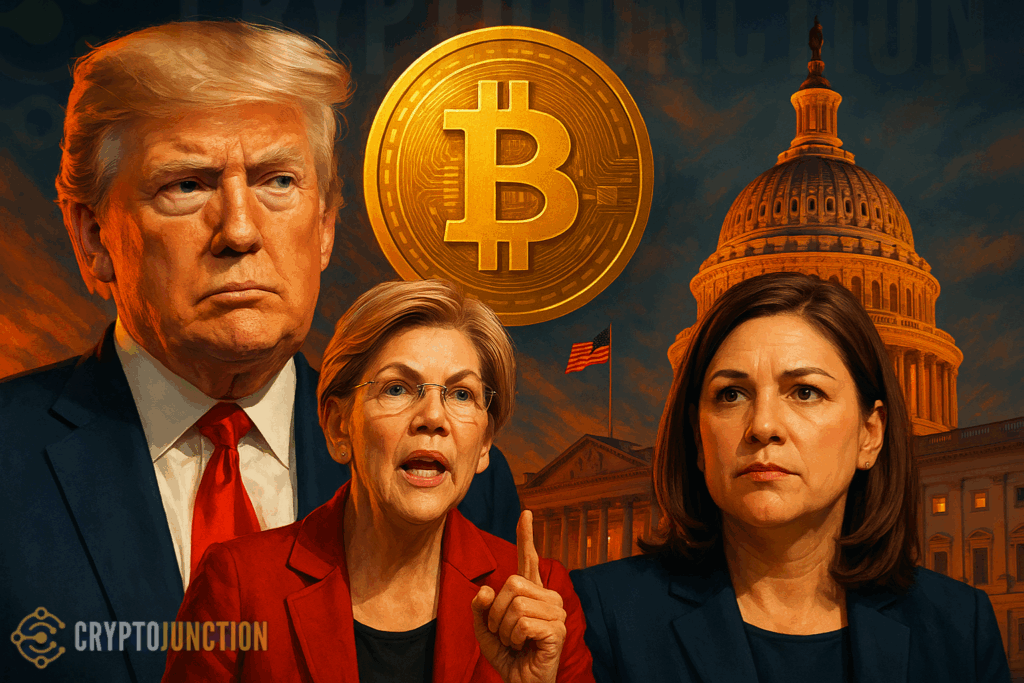Power, politics, and crypto have collided in Washington, and the fallout is impossible to ignore. Former President Donald Trump, his family, and close allies are now at the center of a controversy. This controversy blends financial ambition with national security risks. The calls for an ethics probe have set the stage for one of the most charged political dramas of the year. Particularly involving the interest that Elissa Slotkin has shown.
A Letter That Rocked Washington
The controversy began when Democratic Senators Elizabeth Warren and Elissa Slotkin sent a letter demanding an ethics investigation into Trump-linked crypto dealings. Their concerns focused on possible conflicts of interest that could undermine trust in government decision-making.
The letter, addressed to three key oversight offices—the Commerce Department, the Office of Government Ethics, and the State Department—highlighted the roles of White House “AI and Crypto Czar” David Sacks and U.S. Special Envoy Steve Witkoff. Both were tied to World Liberty Financial (WLF), a crypto company co-founded by Trump and his three sons, alongside the Witkoff family. Notably, Zach Witkoff, Steve’s son, runs WLF as CEO.
The spark for this demand came from an investigation by The New York Times, which revealed two major deals. First, UAE-based MGX invested $2 billion into Binance using WLF’s newly created USD1 stablecoin. Shortly after, the Trump administration approved UAE access to hundreds of thousands of advanced AI chips. These are considered vital technology in the race for artificial intelligence dominance.
National Security Or Personal Profit?
These events have raised alarms not just about financial dealings but also about their implications for national security. The chips approved for transfer to the UAE represent some of the most advanced and scarce resources in the tech world. Warren and Slotkin argued that the timing of these transactions suggested a troubling overlap between private gain and public policy. Elissa Slotkin found this particularly concerning.
In their letter, the senators wrote, “The pattern of these transactions is deeply troubling and reveals that Mr. Witkoff and Mr. Sacks were in positions to control government decisions to personally enrich themselves—even as they created significant national security concerns.”
Trump’s family, however, has defended their involvement. Eric Trump told CNBC that their move into crypto stemmed from necessity, not greed. He explained that traditional financial institutions had cut ties with them. “My father’s the first guy who hasn’t made money off the presidency,” he said, framing the venture as part of their long-standing business instincts.
The clash between these perspectives underscores a larger narrative: critics view the Trump family’s crypto dealings as a potential breach of ethics. However, supporters describe them as legitimate business activity. The tension adds fuel to the political firestorm. Key players like Elissa Slotkin lead the charge and draw crucial attention to the issue.
Crypto Legislation In The Shadows
This controversy is unfolding as lawmakers attempt to draft comprehensive crypto regulation. Both the House and Senate have separate versions of a crypto market structure bill. These versions must eventually be reconciled. Senate Banking Committee Chair Tim Scott had aimed to move legislation forward quickly. Yet, competing priorities, including a looming government shutdown, are already delaying progress.
Warren, a leading voice on the Senate Banking Committee, has insisted that addressing potential conflicts of interest is critical before new rules for digital assets take shape. “Such unbridled conflicts of interest have no place in the U.S. government,” she warned, urging investigators to move swiftly.
The battle over Trump’s crypto connections now sits at the intersection of money, politics, and global competition. Billions of dollars, sensitive technology, and the future of U.S. crypto regulation are all caught in the crossfire. Elissa Slotkin’s involvement continues to draw attention in this complex situation.
The unfolding story illustrates how personal ambition can collide with public responsibility. Rapidly shifting technology further complicates that balance. Whether this probe leads to formal consequences or fades as another political clash, the questions raised will influence how crypto and government power are viewed for years to come. Elissa Slotkin plays a significant role in the discourse surrounding these issues.

